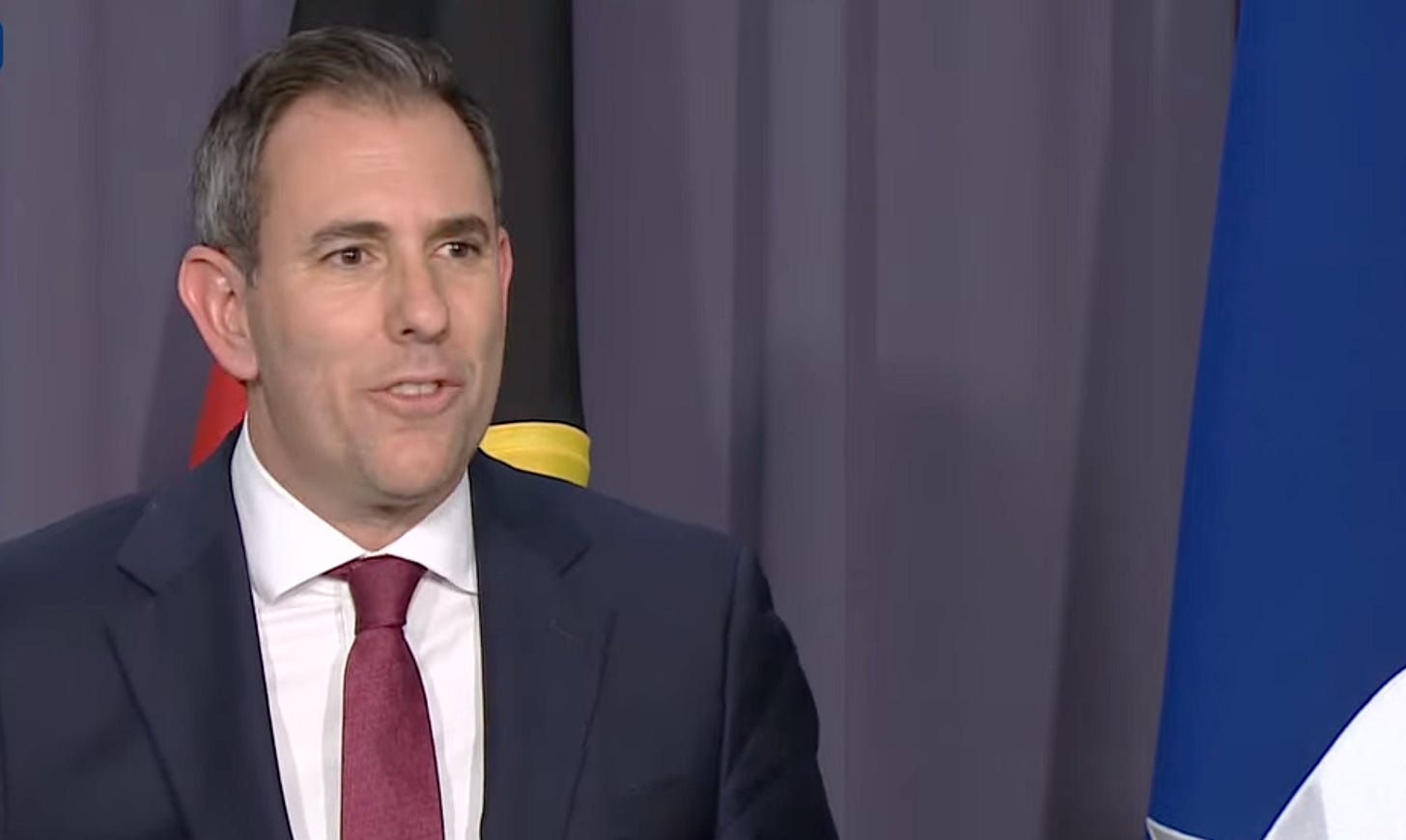Australian Government Unveils Sweeping Economic Reforms Following Productivity Roundtable
Treasurer announces immediate action on tariffs, regulation as consensus emerges on road user charging
Today’s email is brought to you by Empower your podcasting vision with a suite of creative solutions at your fingertips.
Australian Treasurer Jim Chalmers announced a comprehensive package of economic reforms Thursday, emerging from a three-day productivity roundtable that produced what he called "broad areas of consensus" on boosting the nation's economic performance.
The government will immediately begin abolishing hundreds of additional "nuisance tariffs" and accelerating environmental approval processes, while laying groundwork for longer-term changes including potential road user charging and tax system reforms targeting intergenerational equity.
"High living standards is the holy grail. And a more productive economy is how we deliver it," Chalmers said during a press conference following the roundtable that included business leaders, union representatives, academics and government officials.
The treasurer outlined 10 reform directions that emerged from 29 hours of discussions involving what he described as 327 separate contributions from participants. The package represents one of the most ambitious reform agendas announced by the Albanese government since taking office.
"I finished those three days more optimistic about the progress that we can make together than I was at the start," Chalmers said. "And that's because people approached it in the right spirit."
Immediate Action Items
Chalmers announced approximately 10 areas where the government plans swift action, beginning with Trade Minister Don Farrell leading efforts to eliminate hundreds more nuisance tariffs through a consultative process.
Climate Change and Energy Minister Chris Bowen will reduce complexity and red tape in the National Construction Code, while Environment Minister Murray Watt will accelerate Environment Protection and Biodiversity Conservation Act legislation following principles from the Samuel Review calling for "stronger standards, faster approvals, more transparency and integrity."
The government also plans to address what Chalmers described as a backlog of environmental approvals for new homes "most likely in the tens of thousands," with Watt and Housing Minister Julie Collins working together to clear delays.
Finance Minister Katy Gallagher and Chalmers have written to major regulators seeking specific ideas on better regulation and cutting compliance costs. "We have literally hundreds of ideas from the regulators, which is a very good thing," Chalmers said, adding the government will release those letters publicly to generate debate about implementation.
Truth matters. Quality journalism costs.
Your subscription to Mencari directly funds the investigative reporting our democracy needs. For less than a coffee per week, you enable our journalists to uncover stories that powerful interests would rather keep hidden. There is no corporate influence involved. No compromises. Just honest journalism when we need it most.
Not ready to be paid subscribe, but appreciate the newsletter ? Grab us a beer or snag the exclusive ad spot at the top of next week's newsletter.
Ten Reform Directions
The comprehensive reform package centers on 10 key areas: progressing toward a single national market, simplifying trade and reforming tariffs, better regulation and cutting regulatory clutter, speeding approvals in national priority areas, building more homes quickly, making artificial intelligence a national priority, attracting capital and deploying investment, building a skilled and adaptable workforce, creating a better tax system, and modernizing government services.
Gallagher will introduce a regulatory reform bill this year advancing the "tell us once" principle, designed to prevent people from supplying identical information repeatedly for different government purposes. The minister will also accelerate work on an Australian Public Service artificial intelligence plan.
Industry and Science Minister Ed Husic will expedite broader national AI capability planning, incorporating feedback about national interest principles for data centers and associated resource requirements.
Tax System Overhaul
The roundtable concluded with several hours of discussion about tax reform, with Chalmers identifying three key objectives for future changes: ensuring a fair deal for working people including intergenerational equity considerations, providing affordable and responsible business investment incentives, and creating a simpler, more sustainable system capable of funding essential services.
"I think our tax system is imperfect and one of its most troubling imperfections is best seen through an intergenerational lens," Chalmers said, noting widespread agreement among participants about responsibilities to future generations.
The treasurer emphasized the government is not planning "another 18 months of very public tax review when a lot of the issues are pretty well known," instead opting for structured work in the three identified areas with ongoing consultation among roundtable participants.
When asked about election timing for potential tax changes, Chalmers said decisions would remain with Cabinet, though he noted road user charging as an example of something the government would like to advance sooner.
Road User Charging Consensus
One of the most significant developments was what Chalmers described as surprising consensus support for road user charging, despite no final model being determined.
"There was a lot of conceptual support for road user charging," he said, adding that participants viewed it as "an idea whose time has come." Chalmers committed to working with Deputy Prime Minister Richard Marles and other ministers to develop state options for discussion at a September 5 meeting with state and territory treasurers.
Key considerations for any road user charging system include determining what vehicles are included or excluded, potential sequencing of implementation, and timeframes for introduction.
Housing and Construction Reforms
The government will examine prefabricated and modular construction methods, with Chalmers noting "a lot of appetite in the room for prefab homes is a way of being more productive in housing and construction and also dealing with costs."
State governments face additional work on planning, zoning and approvals processes, while the federal government will consult on potential coordinator general functions to expedite approvals for major nation-changing projects.
Investment and Capital Markets
Chalmers announced plans to review the superannuation performance test, though he emphasized the government is "not talking about abolishing the performance test and we are not talking about in any way interfering with the sole purpose of super funds, which is to deliver the maximum returns that they can for the members."
The review aims to ensure no unnecessary obstacles prevent institutional investors like superannuation funds from investing in housing and other areas of national need. The government will also examine special investment vehicles to determine if they're achieving intended objectives.
Skills and Workforce Development
Significant appetite emerged for enhanced work on jobs and skills councils, better recognition of international and domestic qualifications, joining up the tertiary education system, and examining TAFE self-accreditation processes.
Participants supported greater access to credit transfers and reviewing migration points testing to attract highly skilled workers. There was "broad agreement" on recommendations from the Jobs and Skills Australia AI capability study, representing convergence between business groups and unions.
Artificial Intelligence Framework
The roundtable advanced discussions about AI regulation without reaching complete consensus. Communications Minister Michelle Rowland continues work on copyright aspects, while the government will conduct gap analysis to determine whether existing legislation can meet AI regulation objectives or if comprehensive new legislation is required.
"Not a unanimous view yet, but a little bit closer together, and I see that as a very good thing," Chalmers said about AI regulatory discussions.
Government Services Modernization
Gallagher will explore additional procurement modernization and better use of data to improve government services, including AI applications while maintaining human decision-making elements. She also oversees a Data Act review with reform intentions.
Implementation Timeline
The government emphasized that significant work begins now, with Cabinet ministers leading implementation in their respective portfolios. Chalmers stressed respect for ministerial responsibilities, noting roundtable participants "considered themselves to be informing the work of cabinet ministers and their deliberations" rather than replacing government decision-making.
Several measures will advance quickly, including the tariff reductions and regulatory streamlining, while longer-term reforms like tax changes and road user charging will require extensive consultation and coordination with state governments.
Roundtable Process
The three-day event brought together business leaders, union representatives, academics, economists and public servants for what Chalmers described as an unprecedented collaboration on economic reform priorities.
"We don't propose to cut across the important work that ministers do and that the government does more broadly," he said, emphasizing the consultative nature of the process while maintaining clear lines of governmental authority.
The treasurer noted more appetite for reform across more areas than anticipated, describing the consensus-building approach as characteristic of the Albanese government's collaborative style.
"We genuinely believe in our hearts that the best kind of progress that we make is the progress we make together," Chalmers concluded, calling the opportunity to govern during rapid change "an unbelievable privilege."
The comprehensive reform package represents the most significant economic policy announcement from the government in months, with implementation beginning immediately across multiple portfolios while longer-term structural changes undergo further development and consultation.
Got a News Tip?
Contact our editor via Proton Mail encrypted, X Direct Message, LinkedIn, or email. You can securely message him on Signal by using his username, Miko Santos.
Sustaining Mencari Requires Your Support
Independent journalism costs money. Help us continue delivering in-depth investigations and unfiltered commentary on the world's real stories. Your financial contribution enables thorough investigative work and thoughtful analysis, all supported by a dedicated community committed to accuracy and transparency.
Subscribe today to unlock our full archive of investigative reporting and fearless analysis. Subscribing to independent media outlets represents more than just information consumption—it embodies a commitment to factual reporting.
As well as knowing you’re keeping Mencari (Australia) alive, you’ll also get:
Get breaking news AS IT HAPPENS - Gain instant access to our real-time coverage and analysis when major stories break, keeping you ahead of the curve
Unlock our COMPLETE content library - Enjoy unlimited access to every newsletter, podcast episode, and exclusive archive—all seamlessly available in your favorite podcast apps.
Join the conversation that matters - Be part of our vibrant community with full commenting privileges on all content, directly supporting The Evening Post (Australia)
Catch up on some of Mencari’s recent stories:
It only takes a minute to help us investigate fearlessly and expose lies and wrongdoing to hold power accountable. Thanks!









